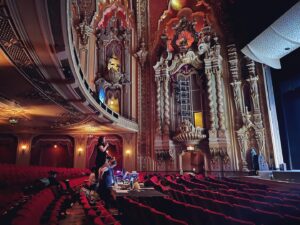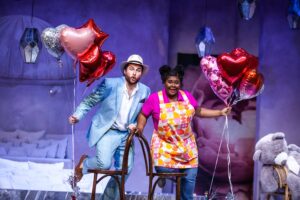Q&A with Eve Summer, Director of Les Mamelles de Tirésias & The Seven Deadly Sins (Part One)

Hailed as “a rising star of stage directing [whose] approach to directing refreshes hope for the future of opera,” Eve Summer returns to Curtis this spring to direct Francis Poulenc’s Les Mamelles de Tirésias and Kurt Weill and Bertold Brecht’s The Seven Deadly Sins on the heels of rave reviews for her acclaimed Curtis Opera Theatre productions of Così fan tutte in 2022 and Albert Herring in 2020.
In part one of this Q&A, the acclaimed director, producer, and choreographer discusses the double bill, the themes of each opera, and how the set and costume design capture the spirit and thematic elements of these groundbreaking works.
Why do you think the unique pairing of Les Mamelles de Tirésias and The Seven Deadly Sins works so well as a double bill?
Each opera is rooted in the birth of a bold new style of theater: Surrealism coined by Guillaume Apollinaire for his play Les Mamelles de Tirésias which Poulenc adapted for his marvelous, biting, absurd opera of the same name, and Epic or Dialectical Theater, coined by Bertolt Brecht who wrote the libretto for Weill’s gorgeous, unrelenting, and heart-rending The Seven Deadly Sins. The juxtaposition will wallop you in the best way, the surreal and the epic, caprice and cruelty, the ludicrous and the grotesque—our charge is to explore two distinctive examinations of the very core of our urges, identities, and imperatives as humans.
Do you consider these operas to be feminist works of art, and are their themes still applicable to the current dialogue surrounding gender identity, women’s rights, and gender equality?
 I don’t know that I would necessarily describe them as feminist works of art—which is not to say that they are misogynistic. Operas are not created to exist in a vacuum. They’re created to be done over and over again, and so I believe that both pieces welcome the feminist perspective.
I don’t know that I would necessarily describe them as feminist works of art—which is not to say that they are misogynistic. Operas are not created to exist in a vacuum. They’re created to be done over and over again, and so I believe that both pieces welcome the feminist perspective.
I find Les Mamelles, in particular, to be of its time and completely ahead of its time. It teaches us the absurdity of the gender binary. Le Gendarme can only see Le Mari [the husband of Thérèse] as a woman because of what he’s wearing, even though he’s saying, “Hello! It’s me.” And he is not able to recognize his own wife just because she doesn’t have breasts. Mamelles puts into sharp comic relief the absurdity of parenthood and of the gender binary, of what breasts mean and what breasts mean to different people. The thing for me that’s really feminist about it—while first, I am a woman, so inherently, my lens is that perspective—is that there’s something very meta about it as well. This piece was created by men, from their perspective, and on baby making and femininity, the role of femininity and motherhood in society, what women really want, what breasts are and what should represent breasts, and what it is to be pursued by an aggressive man.
The piece exists in 2024 for a modern audience, for birthing people, for women, for a generation who recognizes gender as a social construct full of the whacky added meta of these brilliant creators making a purposefully absurd story about femininity and the gender binary and childbearing from a masculine perspective. I feel a charge to lean into that using principles of surrealism through the lens of contemporary motherhood.
How do the set and costume designs enhance the storytelling surrealism, social commentary, and thematic elements of both operas?
 Poulenc started mulling over turning Apollinaire’s play into an opera in the ’30s, and he finished it after World War II, which was the same period that Weill and Brecht were swiftly creating Seven Deadly Sins. The double bill is gently rooted in the 1930s through our props and costumes, and the scenery is more of an abstract modular canvas for the storytelling. We aren’t rigidly adhering to period precision, but our baseline for the silhouette of the main story points is the 1930s for both shows, and some of our props pass through from Mamelles into Seven Deadly Sins to further make that link.
Poulenc started mulling over turning Apollinaire’s play into an opera in the ’30s, and he finished it after World War II, which was the same period that Weill and Brecht were swiftly creating Seven Deadly Sins. The double bill is gently rooted in the 1930s through our props and costumes, and the scenery is more of an abstract modular canvas for the storytelling. We aren’t rigidly adhering to period precision, but our baseline for the silhouette of the main story points is the 1930s for both shows, and some of our props pass through from Mamelles into Seven Deadly Sins to further make that link.
Cameron Anderson, our incredible scenic designer, created an abstract container for both operas that functions independently and uniquely for each piece but crosses over and supports both operas as a unified theatrical experience for the evening. It’s not the first time we as a team have worked together. We don’t approach the design perspective by taking all of those influences and then finding a way to highlight them. We digest that knowledge and history, then try and find the way that feels right in this moment in time for us to tell the story.

In Seven Deadly Sins, the surreal radiates through our scenery and the use of our props, and it is sort of like an uncanny, extraordinary treatment of ordinary objects and space in that piece. In that same vein, the Surreal style of theatre and the Epic style of theatre also have these crossover points that we explore in Mamelles, which is mostly Surreal. A key part of it for me is breaking the wall in really big ways by turning the lens to the audience to see our world reflected back at us. What does it mean to ask someone to make a baby? What are the implications of enforcing our constructed gender binary on every person that we encounter? It’s a crazy double bill—every moment is mind-blowing and feels like a surprise.
Visit Eve Summers‘s official website HERE.
CURTIS OPERA THEATRE: LES MAMMELES DE TIRESIAS & THE SEVEN DEADLY SINS
Transformations of Desire: A Captivating Opera Double Bill
March 15, 2024 | Friday at 7:30 p.m.
March 17, 2024 | Sunday at 2:30 p.m.
Philadelphia Film Center, 1412 Chestnut Street
Click HERE for more information.
Q&A by Ryan Scott Lathan. Part two of this interview will appear in Curtis’s newsfeed on Wednesday, February 28, 2024.
Photos credits: 1.) Photo of Eve Summer by Gentle Grace Photography. 2.) Image of Ms. Summer directing Opera Columbus’s Rigoletto. 3.) Gentle Grace Photography. 4.) Image by Jacob Chang-Rascle. 5.) Thomas Petrushka and Lindsey Reynolds in Eve Summer’s production of Così fan tutte with Curtis Opera Theatre; David DeBalko. 6.) Candid photo from Ms. Summer’s production of Le contes d’Hoffmann with Opera Orlando.


